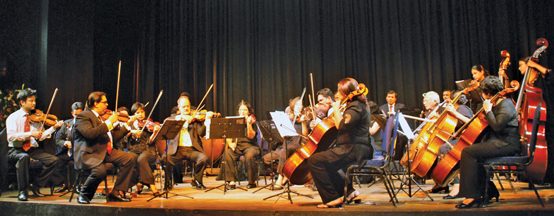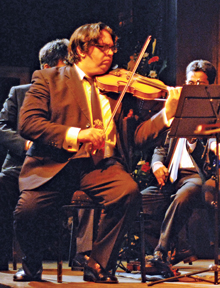|
Celebrating masters:
Demonstration of brilliance in chamber music
by Ranga CHANDRARATHNE
|

CMS at the concert
Pix by Lasanda Kurukulasuriya
|
The ensemble of the Chamber Music Society of Colombo, in a
performance exclusively sponsored by the German Embassy, presented the
Bicentennial Concert 2009. This time, the warm and clear acoustic of the
Lionel Wendt Theatre was the chosen venue. The concert was the Society’s
second 200/250-year birth and death commemoration of the three great
German-speaking composers, namely, Georg Fredrick Handel, Franz Joseph
Haydn and Felix Mendelssohn.
It was nothing short of an outstanding success for all involved. The
ensemble, led by its passionate artistic Director/Concertmaster,
Lakshman Joseph de Saram, began the concert with a controlled bang, the
first chord to G. F. Haydn’s overture to his opera ‘incontro improvviso’.
The French-style Adagio-meastoso that followed set the stage perfectly.
Then quite surprisingly, Haydn launched into a Presto, a wild sounding
‘Turkish’ street band with clanging cymbals and loud drums, very much in
the manner of Mozart’s ‘Abduction of the Seraglio’ overture. A charming
slow movement with solo violoncello followed before the briefest reprise
of the Presto. The playing was mostly committed with few mishaps in
intonation in all departments. The overture is scored for pairs of oboe,
horns, trumpets, timpani and cymbals, with the usual compliment of
strings.
The Society’s Mendelssohn offering was his third string symphony in e
minor. A repeat performance from their sold out Goethe Institute
‘Tribute to the Masters’ concert earlier in the year. Joseph de Saram’s
artistic direction gave Mendelssohn’s youthfully naive work a very
sumptuous and sophisticated air.
Although carefully primed and admirably played, it was interesting to
note how the true and less forgiving acoustic of the Lionel Wendt
highlighted in the most irritating way, the discrepancies in intonation
in the ensemble, discrepancies that were certainly not this apparent in
the much smaller but richly reverberant hall of the Goethe Institute.
The first seven of the set of 12 symphonies were all composed in
Hamburg in 1821. It is hard to imagine that Mendelssohn was only 12
years old at the time of their composition.
Handel’s incidental music to his music drama ‘Hercules’ was next on
the program. The work was composed in 1744 to a libretto by the Rev.
Thomas Broughton after Sophocles and Ovid, and premiered at the King’s
Theatre in London in 1745. Outstanding and revelatory was the ‘Sinfonia’
to Act III. To quote from the well-written program notes, the music was
‘brooding with outrageous bursts of agitated hysterics’, Joseph de
Saram’s condescending musical arrogance at times leads him to a tendency
to over interpret, but in this instance, he was inspired, a most
illuminating outing where Handel and the audience were the ultimate
beneficiaries.
Bookending the intermission, Handel’s overture to his opera
‘Agrippina’ began the second half. Truly visceral playing, breathtaking
speed and shocking pauses with slashing strings and melancholic oboe
portrayed a vivid Roman empire full of bloodletting, lust and remorse.
It was indeed an eye-opener on how potent and electrifying an orchestral
string section can actually sound when given the green light and right
direction.
|

Artistic Director Lakshman Josheph de Saram |
The concertmaster’s playing stood out with its searing white heat
intensity, it was clear that he was undeniably ‘moved and involved’,
both physically and psychologically by the unfolding story line and
creative process.
The likes we have not witnessed in the local eastern and western
classical music world, which almost always goes to great lengths to be
modest and pleasantly sedated, no matter what the musical context is. On
the other hand, this performance was a blowtorch to the senses.
We can only imagine with wonder, what the total effect could have
been if more of the players contributed as much effort to the score.
Closing out the concert was Hayden’s great Symphony number 82 in C
major, nicknamed the ‘Bear’. It is scored for flute, pairs of oboes,
bassoons, horns, trumpets, timpani, and strings. Overall, although very
dynamic, we thought the symphony’s forward momentum to be too
relentless, no respite even in the more relaxed ‘middle’ movements. The
charms of Beecham’s legendary Haydn recordings were obviously not on the
artistic directors mind when he approached this symphony this time. The
Andante was neatly played, but at a tempo that was much faster and
driven than anyone is typically used to. Even faster that the most
‘authentic’ of period performances.
Strings dominated the balance throughout. It was a pity that the
brass and woodwind were overly cautious. We would have preferred a
brighter more present sound from them. Also, as noted in previous
reviews of the ensemble, the double bass section was much more visible
than audible. On the plus side, there were bold and defined rolls and
strokes from the timpanist in the last movement’s roaring climaxes. A
richly deserved encore was called for, and the ensemble repeated the
last page of the symphony. A gimmicky but very exciting dramatic ‘pause’
between the last two chords, presumably to show off the obvious
discipline and whiplash precision of the ensemble, left the audience
laughing and exhilarated. An un-common standing ovation followed from
the sold out auditorium.
As expected, the Chamber Music Society of Colombo, with its well
defined long range plans and professional international management team
and advisors, appears to be gradually formulating a pragmatic strategy,
that will eventually lead to the direction that western classical and
new ‘serious’ music will take, in the next stage of development in the
arts of a unified Sri Lanka. The Society’s professional attitude,
progressive agenda and well-buffed end product can only help in
improving the overall standards.
Although the Society is primarily aimed at the upper echelon of the
intelligentsia, and chamber music, both old and new, by its very nature,
the guarded realm of a privileged minority, we are pleased to notice the
Society taking a more egalitarian approach in its door policy and
availability of tickets. And as the German ambassador stated in his
opening remarks before the concert, we are all very happy at the thought
that the Society is planning on sharing their art in the very near
future with our brothers and sisters in the north and east. A gesture,
which will be greatly appreciated in this hour of reconciliation and
sensitiveness. |

